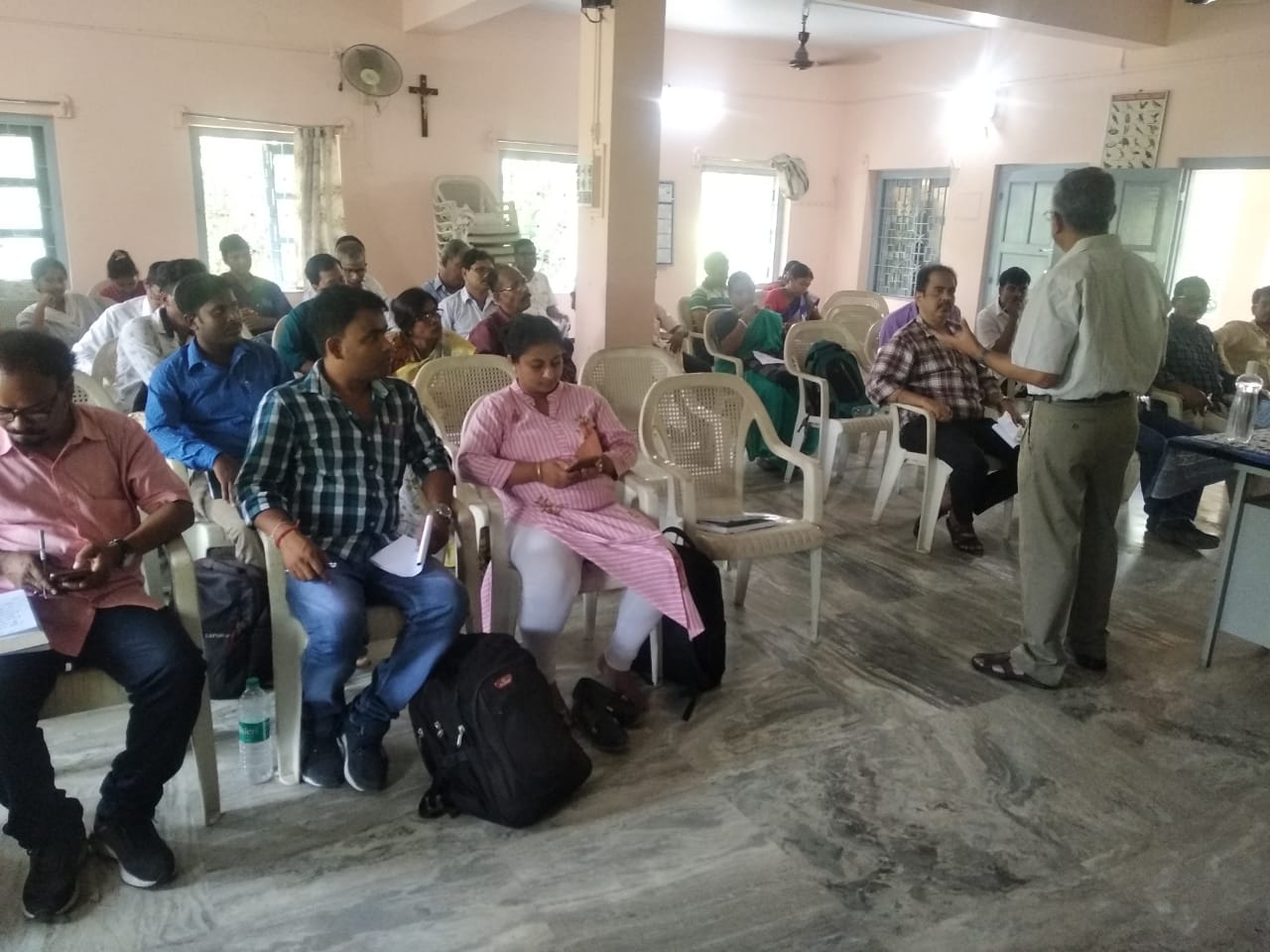

Mukti Participated in the Training Session on Government Projects and Schemes
On behalf of Mukti, Mr. Harisadhan Mondal and Mr. Pintu Halder have participated in a training on various Government projects and schemes related to insurance plans, agriculture and climate risk management. The training has been organized by two NGOs – SPADE and Baruipur Palli Unnayan Samiti on 28th April 2022 at the conference hall of Bairuipur Palli Unnayan Samiti.

With Mukti 40 participants from 15-20 other organizations have participated in the training.
Participants are introduced to all types of insurance schemes implemented by the Government of West Bengal and are provided knowledge of how consumers can get benefit from these schemes.
For the welfare of farmers, the FPO (Farmer Producer Organizations) plan introduced by the government has been highlighted. The main aim of the FPO is to ensure a better income for the producers through an organization of their own. Small producers do not have the volume individually to get the benefit of economies of scale. In agricultural marketing, there is a chain of intermediaries, who often work non-transparently leading to the situation, where the producer receives only a small part of the value, which the ultimate consumer pays. This will be eliminated. Through accumulation, the primary producers can avail the benefit from the economies of scale. Farmers’ Producers have better bargaining power in the form of bulk buyers of produce and bulk suppliers of inputs.

The participants are introduced to the climate risk management program and the policies of the Govt. of West Bengal (GWB) related to it. West Bengal is vulnerable to natural calamities like floods, cyclones, hail storms, thunder squall, drought, landslides, erosion and sometimes earthquakes because of its geo-morphological, climatic and seismic conditions. Floods and Cyclonic storms occur almost every year in different parts of the State, especially Sundarban and inflict huge loss of life and property causing untold hardships and trauma in the lives of the people. These natural disasters strike at the very root of the economic growth of the state. The “GWB” has undertaken several policies with a proactive, comprehensive, and sustained approach to disaster management to reduce the detrimental effects of disasters on the overall socio-economic development of the state.
Project Activities
- About Mukti (2)
- Accreditation (31)
- AGM (63)
- Agriculture Reforms (16)
- ahm2017 (4)
- ahm2017news (2)
- ahm2017runners (2)
- ahm2018runners (1)
- Ambulance Service (2)
- Amplifying Community Voices (9)
- Awards (22)
- Awareness and Empowerment (13)
- Awareness drives (1)
- Book-Bank (13)
- Careers (8)
- CARR (32)
- Ccp1011 (4)
- Chick Rearing Programme for Marginalised Women (5)
- Climate Resilience River Embankment (1)
- Coaching Center (102)
- Community Clinic (2)
- COVID19 (62)
- Cyclone Amphan Relief and Rehabilitation (129)
- Cyclone Bulbul Relief (30)
- Cyclone Relif (2)
- Cyclone Yaas Relief and Rehabilitation (68)
- Editorial (21)
- Editorial by Abir Biswas (1)
- Editorial by Ankita Kothiyal (1)
- Editorial by Kasturi Bakshi (1)
- Editorial by Prof. Pradeep Ray (1)
- Editorial by Ranitendranath Tagore (1)
- Editorial by Sankar Halder (10)
- Editorial by Satyajit Ray (3)
- Editorial by Sohini Mehta (1)
- Editorial by Soumitra Bose (1)
- Editorial by Subhankar Basu (1)
- Education and Enrichment (34)
- Environment and Resilience (9)
- Essential Items Distribution (19)
- Fair/Exibition (1)
- Featured Activities (10)
- Go Green (81)
- Gram Clinic (2)
- Green (20)
- Health (8)
- Health Water & Sanitation (17)
- Hello Beta (1)
- Impact Stories List (31)
- Integrated Development (11)
- Jal hi Kal (2)
- Kerala Flood Relief (3)
- Kitchen Gardening (2)
- Livelihood & Enablement (20)
- Marathon (13)
- MCDF (14)
- Mcdf (112)
- Mcom (6)
- Medical Camp (8)
- MIT (3)
- MKSS (6)
- MSS (11)
- MUKTI Community Shop (1)
- Mukti Craft (2)
- Mukti Cultural (1)
- Mukti Employment (2)
- Mukti Fresh (2)
- Mukti Gram - Egra (2)
- Mukti Gram - Purbashridharpur (8)
- Mukti Gram, Model Village (136)
- Mukti Green (6)
- MUKTI Institute of Technology (MIT) (3)
- Mukti Kishalaya (2)
- Mukti Support (1)
- Mukto Dhara (1)
- NaRKEL (9)
- Obituaries (4)
- Observance Days Celebration (10)
- Organic Farming (3)
- Organic Farming & Training Support (8)
- Pandemic Support (2)
- Pond Rejuvenation (1)
- Prerana (4)
- Projects For Mukti Wide (3)
- Rights and Special Needs (19)
- Riste (2)
- RTI (14)
- Sahosini (3)
- SAM (9)
- Sam (89)
- SDF (9)
- Skill & Enterprise Development (2)
- Skill Enterprise (2)
- star-of-the-week (9)
- STEP (1)
- Success Stories (39)
- Success Story Coaching Center (1)
- Success Story MCDF (6)
- Success Story RTI (1)
- Success Story SAM (9)
- Success Story TSS (20)
- Sundarbans Green (SUN-G) (1)
- Sunderban development fair project (7)
- Sustainable Agriculture (2)
- SWAS (2)
- SwasthoSongini (4)
- Swavlamban Accelerator in Sundarbans (SWAS) (2)
- Talented (2)
- Tour for Cause (31)
- TSK25 2017 (7)
- TSK25 2017 Runners (7)
- TSS (17)
- TSS (112)
- Uncategorized (59)
- Valued Partners (3)
- Vclpk (1)
- Vetp (2)
- View (2)
- VOICE (2)
- workshop (109)